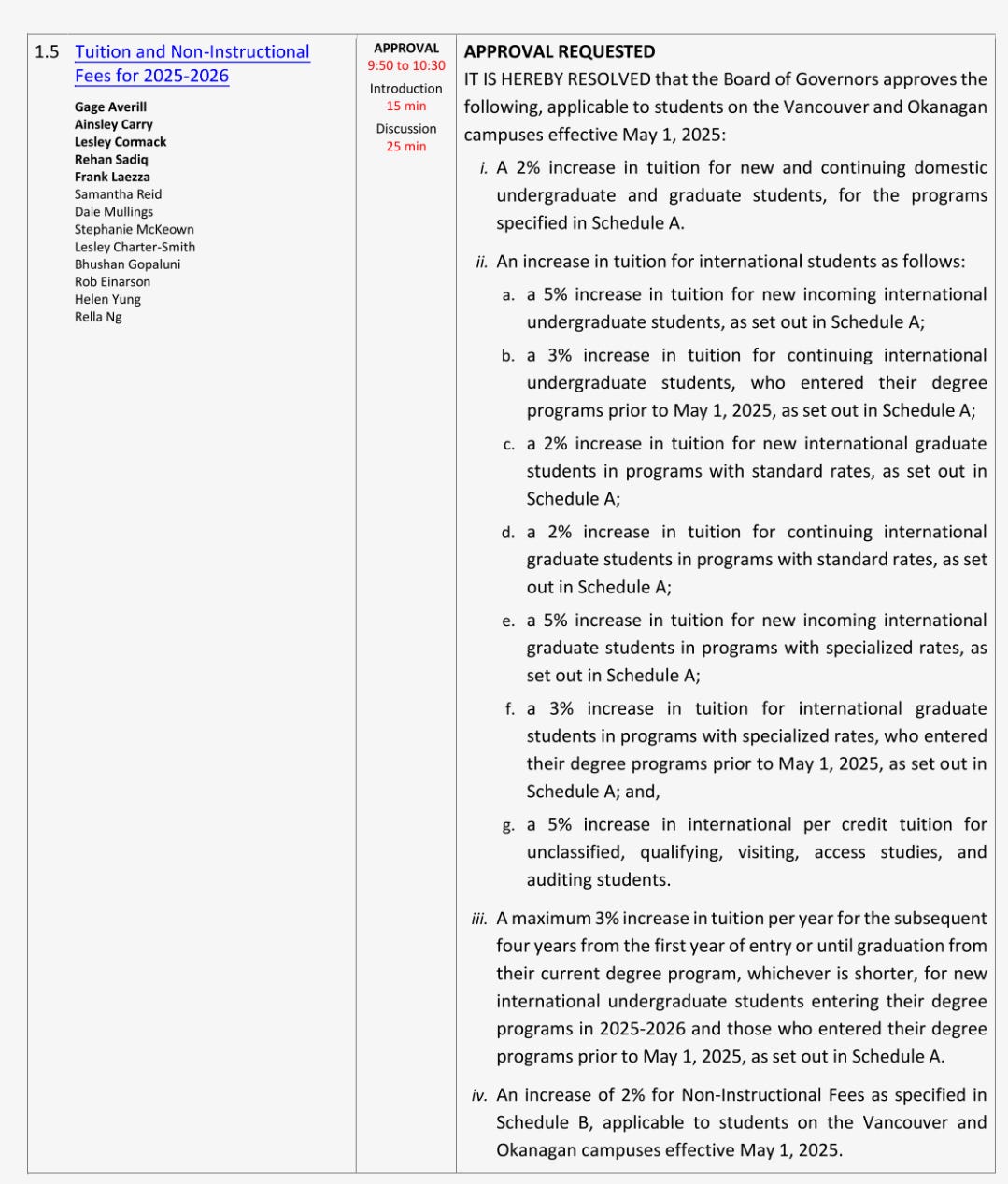Get ready to witness a room full of leaders, innovators, and disruptors raise their hands to hike tuition fees for the umpteenth year in a row. During my two terms on the board there has always been two or three of us that vote no, but that contingent seems smaller these days.
We will be told this is fiscally prudent. We will be assured it has been done with great concern for the well being of students. Likely we will be told how funds have been earmarked for student supports. We will be reminded of our fiduciary duty to maintain a balanced budget. Someone will likely point to UBC being low or mid range in comparison with competitors in the sector.
I imagine governors speaking in favour of the tuition hikes will compliment the admin on their hard work in a difficult time. They might emphasize how much work went into preparing the hike. They may even express some regret that tuition hikes are necessary, while acknowledging the reality of having to do this.
Those opposed may well point to the high cost of living for students and highlight issues of food insecurity.
With modest edits here is my 2019 comment on the repeating circus of ever rising tuition fees.
No Good Reason for Tuition Fees
There is no good reason for tuition fees.
University administrators have long argued that due to the inadequacies of government funding there is no choice but to charge and hike tuition fees. Administrators phrase their support of fees (and fee increases) as a reluctant necessity of life; something that any reasonable person should understand.
I rather wish they spent some time working other funding angles starting with full and effective public funding. Or expend some energy opposing the free market idea of education as privilege, not right.
Unfortunately the idea of the student as consumer is driving how administration sees the enterprise. Education is a transaction between the university as vendor and the student as consumer mediated by a cash for certificate exchange.
We don’t operate with a total market free-for-all. The expectation that a student (as consumer) is obligated to pay some portion of their education is mediated by a societal expectation that university should be reasonably accessible to any citizen. This opens the door to differential fees for non-resident and/or international visa students who can be expected (by this logic) to pay a bigger tuition.
More than at any time in history we expect employable members of society to have some kind of university or college education. Rare is the job that does not require a certificate or degree be it trades, technical, academic, or professional. Is there not a societal obligation and responsibility to provide our youth and young adults with the appropriate educational background without beggaring them?
I think there is.
Cutting fees is one way to start making university affordable and accessible to all potential students.
It’s time that we simply abolish tuition fees across the post secondary sector. Our university leadership can play an important role in facilitating this transformation. We no longer expect people to pay for public K-12 education. That argument was settled long ago when it became clear that a high school education was a requirement for an effective labour force; today the first level of post secondary is every bit as necessary as high school graduation was for our grandparents.
I will be doing my part on December 5th by voting against tuition increases at UBC.





I appreciate you voting against this. I also spent some time meeting with a grad student this afternoon who was in tears at only just (if that) having enough money to eat, and appealing for more money to cover expenses here in Vancouver. Underemployed as I am, I can relate, but I also value the actual work I'm doing and hesitate to get into other work that pays better but produces little or no value for working people, not directly or indirectly.
This is my radical take- The act of voting for a tuition increase is one that relates not to education, rather one that supports a client bureaucracy of the state. I think to make the kinds of excuses you list is to either lie, or express some form of ignorance. It functions as a selection mechanism, in Darwinian terms, and reinforces the participation in university governance by the kinds of people who will continue to vote that way. It serves the interests of the few, not the many. I very much appreciate you participating as you do, as well as your continued tolerance of me gas bagging in your comments sections. I'm showing restraint on this one.